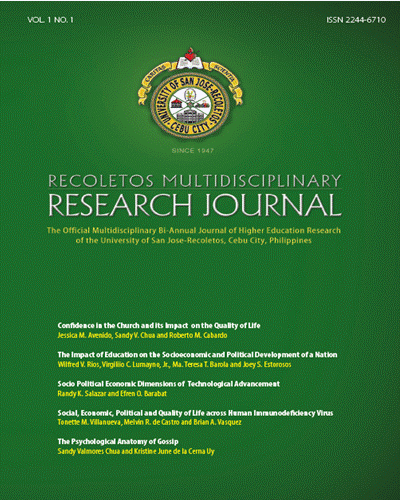Casual Sex among Young People
DOI:
https://doi.org/10.32871/rmrj1301.01.06Keywords:
Casual sex, sex, non romantic relationshipAbstract
This paper examines the reasons why young people engage in casual sex by investigating the reasons why an individual gives in to transitory pleasure. It also examines of the psyche of those who do not indulge in. It also leads to the formulation of a Casual Sex Theory that individuals who are highly rational and are self-actualized are not prone to casual sex. Thus, an individual’s orientation that is anchored on the physiological and sexual aspects make him vulnerable to casual sex. Persons with hedonistic and pragmatic orientation are likely to engage in casual sex. In conclusion, an elevation of the level of awareness among young people from their rational capacity has to be given primary importance for the youth are the most vulnerable in casual sex phenomenon.
References
Andrews, J. DePaul University, Finance, a student in College Year in Athens’ Spring 2003 Philosophy class.
Anissimov, Michael. What is Moral Relativism? USA: Conjecture Corporation.
Boscia, Ted. (2012). Study: Casual teen sex linked to higher depression rates. Cornell Chronicle: Ithaca, NY USA.
Cornell University. (2004). Guide to the UrieBronfenbrenner Papers,
[ca. 1960-2011].
Cohen, Marc S. Course Outline. (2004).
Ember, Carol R. & Ember Melvin. (2004). Cultural Anthropology.
Lyons, Heidi et.al.(2010) Casual Sex Among Young Adults: Education Differentials. Ohio, USA: Bowling Green University.
McLeod, S. A. (2008). Cognitive Dissonance Theory. ________. (2008). Freud:Psychosexual Stages.
McNulty, Jennifer. (May 3, 1999). A lifetime of curiosity about human motivation garners Psychology’s top prize for Elliot Aronson.
Miller, Kathleen. (2008). College Students Use of Alcohol and Energy Drinks.USA:Research Institute on Addictions - University at Buffalo.
Partington, R.2013. What is Hedonism? Sparks, NVUSA:Conjecture Corporation,
Wadley, J.(2011).Women like Casual Sex just as much as men do. USA:University Record Online-University of Michigan.
Wilkes, Kathleen V. (Oct., 1978). Mind: The Good Man and the Good for Man in Aristotle’s Ethics. New Series, Vol. 87, No. 348, pp. 553-571. UK:
Oxford University Press.
Downloads
Published
How to Cite
Issue
Section
License
Copyright of the Journal belongs to the University of San Jose-Recoletos


